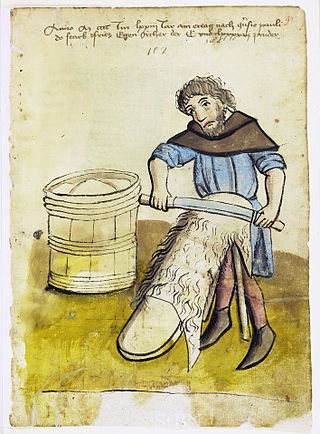Weber is a surname of German origin, derived from the noun meaning "weaver". In some cases, following migration to English-speaking countries, it has been anglicised to the English surname 'Webber' or even 'Weaver'.

Patrick is a male given name of Latin origin. It is derived from the Roman name Patricius. Alternative meaning could be derived from Old English elements Pǣga, of an unknown meaning, and rice meaning ruler.
Muller is a surname. Notable people with the surname include:
Braun is a surname, originating from the German word for the color brown.
Esposito is an Italian surname. It ranks fourth among the most widespread surnames in Italy. It is mostly popular in the Campania region, most specifically, in the Naples area. but it has presence even in the rest of Italy.
Schaefer is an alternative spelling and cognate for the German word schäfer, meaning 'shepherd', which itself descends from the Old High German scāphare. Variants "Shaefer", "Schäfer", the additional alternative spelling "Schäffer", and the anglicised forms "Schaeffer", "Schaffer", "Shaffer", "Shafer", and "Schafer" are all common surnames.
Albert is an English, Low German, French, Catalan, or Hungarian surname, derived from the Germanic personal name Albert, which was one of the most widely used Germanic personal names in the medieval period. It may refer to:

Tanner may be a surname of either English, German or Finnish origin. The Anglo-Saxon Tanner was an occupational surname referring to an individual involved in the tannery process. The German form, also spelled Danner, is likely topographic from German Tanne, meaning 'fir tree' and Tann, a place name referring to this. In the Finnish language surname the word tanner is a synonym for 'field' or 'ground'.
Schneider is a very common surname in Germany. Alternative spellings include: Schneyder, Schnieder, Snyder, Snider, Sneider, Schnyder, Znaider, Schnaider, Schneiter, Shneider, and Sneijder, Snijder (Dutch), Snither (English), Snyman (Afrikaans), Schnider, Sznajder, Szneider (Polish), Snaider, Šnajder (Serbo-Croatian), and Schneidre (French).
Gross or Groß in German is the correct spelling of the surname under German orthographic rules. In Switzerland, the name is spelled Gross. Some Germans and Austrians also use the spelling with "ss" instead of "ß".
Levy or Lévy is a surname generally of Hebrew origin. It is a transliteration of the Hebrew לוי meaning "joining". Another spelling of the surname—among multiple other spellings—is Levi or Lévi.
Farmer is an English surname. Although an occupationally derived surname, it was not given to tillers of the soil, but to collectors of taxes and tithes specializing in the collection of funds from agricultural leases. In 2000, there were 68,309 people with the last name Farmer in the United States, making it the 431st most common last name in the nation.
Abraham is a surname. It can be of Jewish, English, French, German, Dutch, Irish, Welsh, Cornish, Breton, Lebanese, Syrian and other origins. It is derived from the Hebrew personal name Avraham, borne by the biblical patriarch Abraham, revered by Jews as a founding father of the Jewish people, and by Muslims as founder of all Semitic peoples. The name is explained in Genesis 17:5 as being derived from the Hebrew av hamon goyim "father of a multitude of nations". It was commonly used as a given name among Christians in the Middle Ages, and has always been a popular Jewish given name. The English name Abram is often a short form of Abraham, but it can also be a shortened version of Adburgham, which comes from a place name. As an Irish name, it was adopted as an approximation of the Gaelic name Mac an Bhreitheamhan "son of the judge". The German name Brahm is often a short form of Abraham, but it can also be a topographic name signifying someone who lived near a bramble thicket. The name Braham has been used as an Anglicization of both Abraham and its patronymic Abrahams by Ashkenazi Jews in the British Isles. Abraham has also been used as an Anglicization of the equivalent Arabic surname Ibrāhīm. It is also found as a given name among Christians in India, and has come to be used as a family name among families from Kerala.
Snyder is an Anglicized occupational surname derived from Dutch Snijder "tailor", related to modern Dutch Snijders and Sneijder. It may also be an Anglicized spelling of the German Schneider or Swiss German Schnyder, which both carry the same meaning. A less common Anglicized spelling of the Dutch Snijder is Snider.
Bieber is a surname of German and Hebrew origin. Notable people with the surname include:
Kern is a surname. Notable people with the surname include:
Ferrari is an Italian occupational surname, the plural form of Ferraro, meaning blacksmith.
This surname has two distinct and separate origins:
Rey is a surname. Notable people with the surname include:

